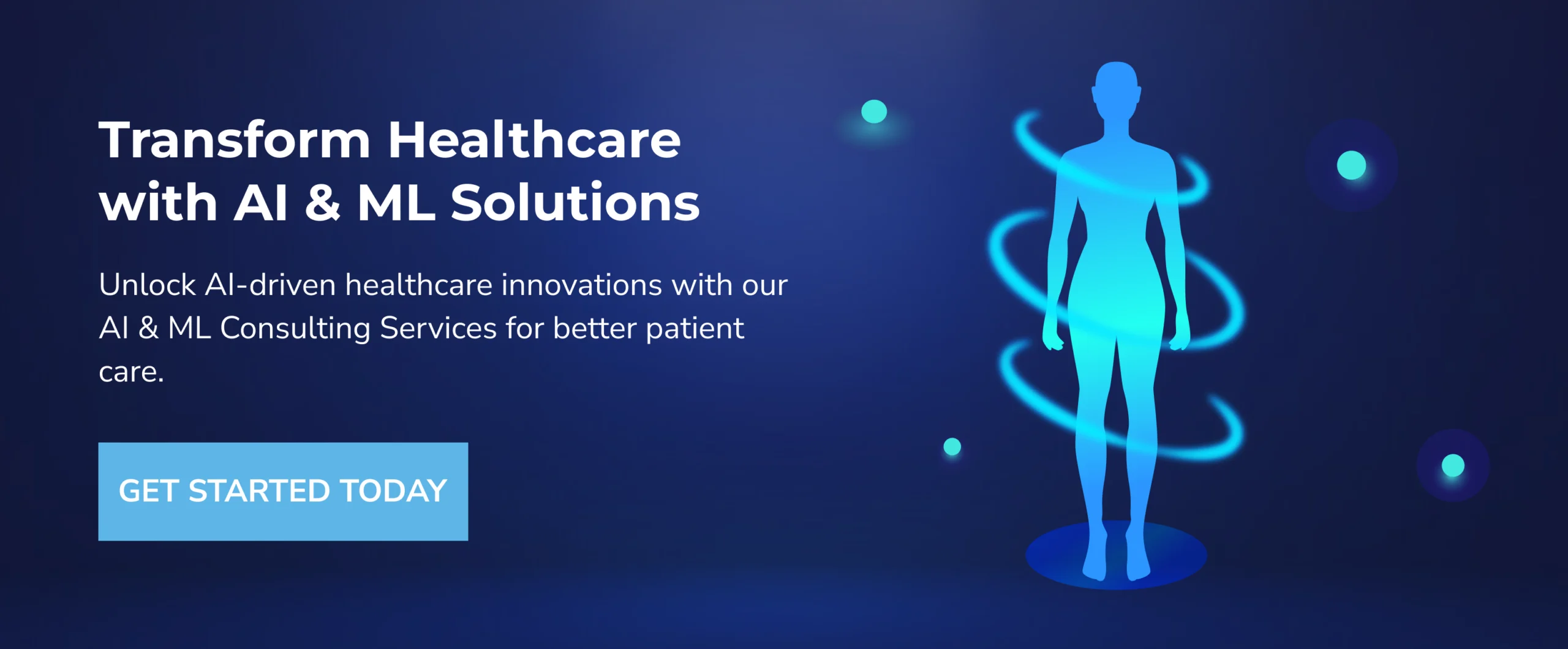AI in Healthcare: Transforming Diagnosis, Treatment, and Patient Care

Artificial Intelligence (AI) is revolutionizing the healthcare industry, transforming the way diseases are diagnosed, treatments are planned, and patients are cared for. By leveraging machine learning (ML) algorithms, AI is enhancing medical decision-making, reducing human error, and increasing efficiency in hospitals and clinics worldwide. The integration of AI & ML Solutions in healthcare is not only improving patient outcomes but also reducing operational costs and streamlining workflows. From AI-powered medical imaging to AI chatbots assisting patients, the possibilities are endless.
This blog explores the key AI applications in healthcare, regulatory and ethical challenges, and the future impact of AI-driven innovations on the medical industry.
Key AI Applications in Healthcare
AI-Powered Medical Imaging and Diagnostics
One of the most significant advancements in AI & ML Development is in medical imaging and diagnostics. AI-powered tools can analyze medical scans such as X-rays, MRIs, and CT scans with remarkable accuracy, often outperforming human radiologists. By identifying patterns that might go unnoticed by the human eye, AI helps detect diseases at earlier stages, leading to timely intervention and improved patient outcomes.
For example, AI algorithms have been trained to detect breast cancer in mammograms, lung diseases in CT scans, and neurological disorders in brain imaging. This technology not only accelerates the diagnostic process but also minimizes the chances of misdiagnosis, allowing physicians to focus on patient care rather than tedious image analysis.
AI-Driven Drug Discovery and Genomics
The pharmaceutical industry is leveraging AI and ML Consulting Services to accelerate drug discovery and genomics research. Traditional drug discovery methods are time-consuming and costly, often taking years before a new drug reaches the market. AI can analyze vast datasets to identify potential drug candidates, predict their efficacy, and optimize chemical compounds for faster development.
In genomics, AI is playing a crucial role in understanding genetic disorders and personalizing treatments. AI algorithms can analyze genetic data to identify disease markers, helping doctors tailor treatments to individual patients. By integrating AI & ML Solutions in genomics, researchers can advance precision medicine, ensuring that treatments are highly effective for each patient based on their genetic profile.
Personalized Treatment Recommendations

AI is transforming patient care by enabling personalized treatment recommendations. Instead of a one-size-fits-all approach, AI-driven healthcare solutions analyze patient data, including medical history, genetics, and lifestyle factors, to recommend tailored treatment plans.
For instance, AI-powered platforms assist oncologists in determining the most effective cancer treatments based on a patient’s genetic makeup. AI can also predict how patients will respond to different medications, reducing trial-and-error treatments and minimizing side effects. By incorporating AI & ML Development into healthcare, providers can enhance treatment precision, leading to better patient outcomes and improved quality of life.
AI Chatbots for Patient Engagement
AI chatbots and virtual assistants are improving patient engagement and streamlining communication between patients and healthcare providers. These AI-powered chatbots can schedule appointments, provide medication reminders, answer common medical queries, and even offer mental health support.
For example, AI chatbots are being used in telemedicine platforms to provide preliminary diagnoses based on patient symptoms. They can also monitor chronic disease patients by collecting health data and alerting doctors to any concerning changes. This not only reduces the burden on healthcare professionals but also ensures that patients receive timely care and support.
Regulatory Challenges & Ethical Considerations
While AI in healthcare offers numerous benefits, it also presents regulatory and ethical challenges. Ensuring compliance with healthcare regulations such as HIPAA (Health Insurance Portability and Accountability Act) and GDPR (General Data Protection Regulation) is critical to protecting patient data and privacy.
Additionally, ethical AI practices must be upheld to prevent bias in AI-driven medical decisions. AI algorithms must be trained on diverse datasets to ensure fairness and accuracy across different demographics. Transparency in AI decision-making is also crucial, as doctors and patients need to understand how AI-generated recommendations are made.
Healthcare providers and AI developers must work together to establish guidelines for responsible AI use, ensuring that AI-driven solutions prioritize patient safety, data security, and ethical considerations.
Conclusion
The future of AI in healthcare is promising, with continuous advancements expected to enhance diagnosis, treatment, and patient care. AI-powered medical imaging, personalized treatments, and AI-driven drug discovery are just the beginning of a healthcare revolution that will improve efficiency and save lives.
As AI and ML Consulting Services continue to evolve, the integration of AI & ML Solutions in healthcare will lead to more innovative and effective treatments. However, addressing regulatory and ethical challenges remains essential to ensure that AI is used responsibly and ethically.
By embracing AI & ML Development, the healthcare industry can unlock new possibilities, making medical care more precise, accessible, and patient-centric. The collaboration between AI technology and healthcare professionals will pave the way for a future where AI plays a pivotal role in improving global health outcomes.